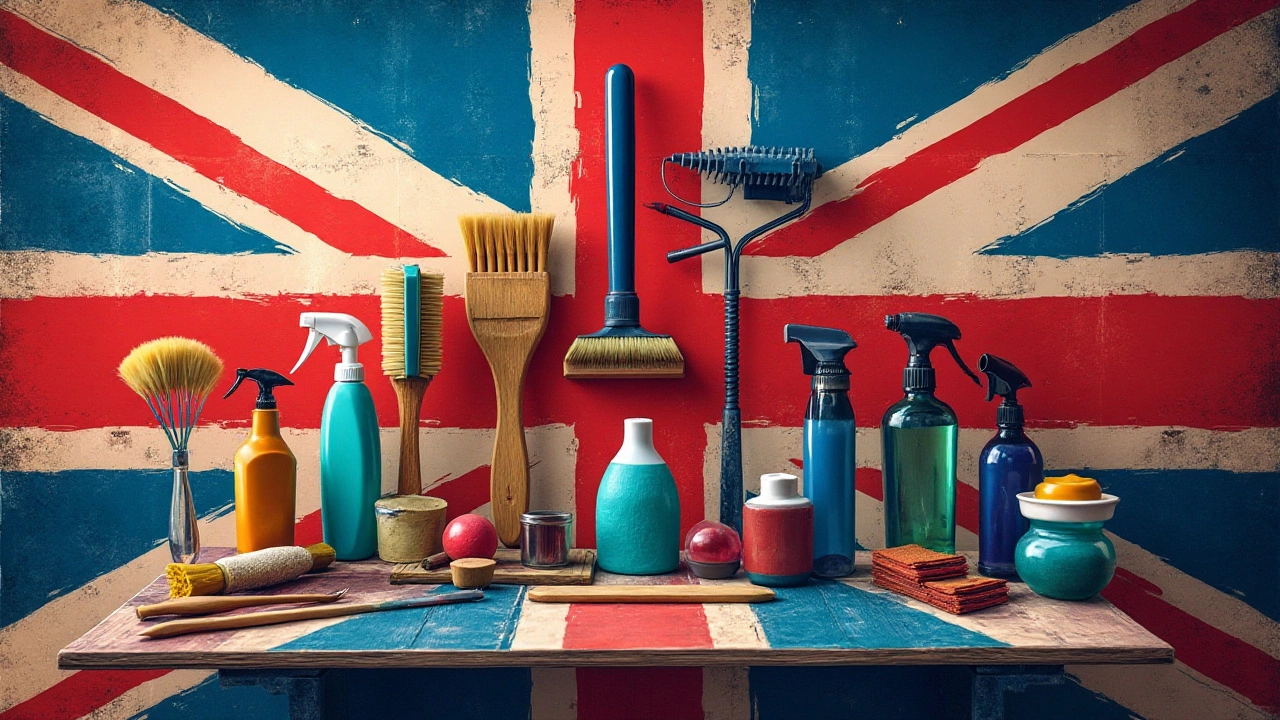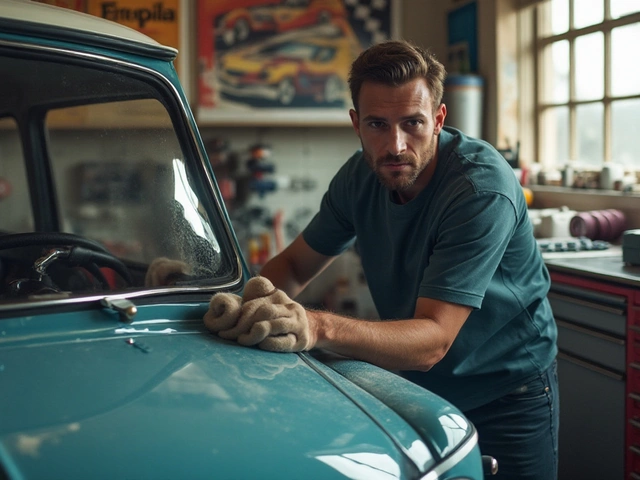Investing in car detailing is not just about keeping your vehicle looking sleek and shiny; it’s about preserving its value and ensuring a long life on the road. As you delve into the world of detailing, one of your first questions might be: how much should I spend?
The answer isn’t a simple one, as car detailing costs can vary widely from one service to another. Different factors come into play: the condition of your vehicle, the type of detailing service you select, and even where you are located. Understanding these can help you budget effectively.
For those keen on keeping their car pristine without frequent trips to the pros, detailing kits might just be your new best friend. They can offer a cost-effective alternative, allowing you to tackle much of the work yourself, while still achieving impressive results.
- Understanding Car Detailing Costs
- Factors Influencing Car Detailing Prices
- Types of Car Detailing Services
- Frequency of Detailing for Optimal Results
- DIY Detailing Kits vs Professional Services
- Tips for Cost-Effective Car Detailing
Understanding Car Detailing Costs
When it comes to understanding car detailing costs, it's essential to appreciate that these expenses can be as diverse as the vehicles themselves. On average, an interior detailing service could set you back anywhere from $75 to $150, whereas a comprehensive exterior service might range between $100 to $200. The full package, encapsulating both exterior and interior, typically hovers around $150 to $300, but there are always variations. These numbers aren’t arbitrary; they often reflect the level of service and expertise you’re receiving. Consider the time and effort a detailer invests, from hand washing and waxing to meticulous vacuuming and steam cleaning.
The geographical location also plays a crucial role in pricing; detailing services in metropolitan areas like New York or Los Angeles are generally more expensive than those in smaller towns or rural settings. This often boils down to the cost of living and business overheads in those regions. Services provided in cities with harsher climates might also cost more, as detailing becomes more intensive due to environmental challenges. Industry surveys suggest that 38% of detailing customers opt for additional services such as protective coatings, which could, in fact, drive the price upwards. But consumers often see this as an investment rather than an expense, as proper care can significantly increase a vehicle's lifespan and resale value.
Not all detailing services are alike, and the offerings can vary significantly between providers. It’s wise to consider what your car truly needs instead of simply opting for the most high-end service. Some vehicles may require advanced treatments like paint correction or ceramic coating, which can add another $500 or more to the bill. A reputable source in the industry once said, "Invest in your car’s emotional and physical appearance — it pays dividends."
As the saying goes, the bitterness of poor quality remains long after the sweetness of low price is forgotten.Understanding the breadth and depth of services can help in identifying what's necessary for your vehicle’s unique needs.
Many car owners nowadays are also enhancing their detailing knowledge and skills by exploring detailing kits, which allow them to perform basic detailing jobs at home. These kits can be a one-time cost ranging from $50 to $200, depending on the brand and contents. While these kits don’t replace professional services entirely, they can significantly reduce the number of visits required to keep a car in top condition. Opting for such kits for routine maintenance can provide a cost-effective alternative for those who enjoy a DIY approach.
If you're someone who covets a cost-effective car care regimen, understanding these intricate details of detailing expenses can be pivotal in making informed decisions. This helps not only in budgeting your finances but also in ensuring that your car gets precisely the care it deserves. With knowledge comes the power to choose wisely and keep your beloved ride gleaming without unnecessary overspending.
| Service Type | Cost Range |
|---|---|
| Interior Detailing | $75 - $150 |
| Exterior Detailing | $100 - $200 |
| Full Detailing | $150 - $300 |
Factors Influencing Car Detailing Prices
When considering the cost of car detailing, it's essential to recognize the variety of factors that can sway prices. At the forefront is the size of your vehicle. Naturally, a small sedan will require less work than a sprawling SUV or a luxury car with intricate detailing demands. Size often dictates labor time and the amount of products needed, making it a primary influencer in pricing. Additionally, the condition of your vehicle plays a significant role. Cars that haven't been cleaned in years will likely be more labor-intensive than those regularly maintained. This aspect encompasses both the interior and exterior of your car, as heavily soiled surfaces or deeply ingrained dirt pose more challenges to achieving a pristine finish.
Another crucial factor is the type and level of service you select. Basic wash-and-vacuum packages will naturally be more affordable than premium options that include waxing, advanced polishing, or ceramic coating services. Each service has its own set of processes and materials, influencing both the cost and time involved. Geographic location is also a notable factor, with prices varying significantly across regions. Urban centers, with their higher cost of living and operating businesses, often charge more than rural areas. But remember, a high price doesn't always equate to superior service, just as a bargain price doesn't necessitate compromise on quality.
"The art of car detailing, much like art on canvas, takes into account every stroke and every detail," says renowned auto detailing expert, Jack Monroe. "Understanding these factors helps in appreciating the time and effort that genuinely go into optimizing every inch of a vehicle."
It's also worth noting that some detailing services use eco-friendly products and techniques, which may influence the cost. Using biodegradable and non-toxic products might come at a premium, but they appeal to those concerned about sustainability and environmental impact. Moreover, the experience and reputation of the detailing service provider can shape pricing. Veteran detailers who have honed their craft over decades might charge more, reflecting both the expertise and the assurance of quality they offer clients. Various promotional deals, memberships, and loyalty programs might also be available for frequent customers, potentially lowering costs over time.
Comparing DIY Kits vs Professional Services
Deciding between DIY detailing kits and professional services is another financial consideration. Kits offer a one-time expenditure and the flexibility for regular upkeep. However, they require initial investment in both the kit itself and the necessary time to use them effectively. By comparison, professional services eliminate the time commitment but come with recurring costs for each session. Those who enjoy the therapeutic nature of hands-on detailing might find kits appealing, while others might prefer the expertise that professionals provide. Balancing your budget with the value you assign to convenience and outcome can guide your decision.
Types of Car Detailing Services
In the world of automotive care, car detailing has evolved into a blend of art and science, offering an array of services tailored to suit various needs and budgets. When we talk about detailing, it’s not just about a quick polish or wash; it’s an extensive process designed to get your vehicle looking as near to showroom condition as possible. A standard detailing service usually consists of two main categories: interior and exterior detailing. While some people might opt for just one, many choose a combination of both for a complete transformation.
Exterior detailing focuses on everything visible on the outside of your car. This involves not just washing and drying, but also polishing and waxing to protect the paintwork from environmental damage. It often includes cleaning wheels, tyres, and windows, ensuring that every part of your vehicle gleams. Some high-end services might even go as far as ceramic coatings, which provide a layer of protection lasting several months. On the other hand, interior detailing is about rejuvenating the inside of your car. This means deep cleaning every nook and cranny, from carpets and upholstery to dashboard and console areas. Upholstery might be shampooed and vacuumed, while leather seats are conditioned to maintain their sheen.
Beyond these broad categories, several niche services have risen to popularity. Engine detailing, once overlooked, is now a sought-after service. It involves cleaning the engine bay, removing dust and grime that can affect performance. Similarly, headlight restoration is crucial, especially considering safety aspects; cloudy headlights can reduce visibility at night. Another specialized service is paint correction, which tackles imperfections and swirl marks on the car's surface. Such detailing goes beyond mere aesthetics; it's about enhancing and maintaining your car's value. A clean car simply performs better, both on the road and in resale value.
The options are vast, and the industry standards continue to evolve. According to a survey by AutoWeek, nearly 60% of luxury car owners invest in extensive detailing services at least twice a year. This highlights the importance placed on upkeep and appearance, especially in high-end vehicles. Choosing the right type of service depends on your vehicle's condition, your area's climate, and of course, your budget. Experienced detailers can guide you to the best choices for your specific conditions. As veteran detailer John Thompson once said, “A little bit of maintenance goes a long way in preserving that new car feeling.”
Detailing is more than just a luxury; it's an essential part of maintaining vehicle longevity and resale value. - AutoWeek

Frequency of Detailing for Optimal Results
Figuring out how often to have your car detailed is more of an art than a science, depending on various factors. Regularity in detailing ensures your vehicle maintains its appeal and stays in shape longer, helping avoid costly repairs later. How frequently you should undertake it largely hinges on the typical conditions your car faces and the level of attention you wish to give to your auto detailing. If you're driving in areas where road salt, bird droppings, or tree sap are everyday encounters, a more frequent schedule becomes not just a choice but a necessity to protect your car's paint. Conversely, a car kept primarily in a garage, avoiding harsh weather, might only need detailing a few times a year to maintain its shine.
Car enthusiasts often swear by the adage of detailing every four to six months. This interval is suggested for those intent on maintaining premium car cleaning standards. By doing so, you ensure that contaminants like dust, dirt, and debris don’t build up over time and cause lasting damage. However, let's not disregard the aesthetic appeal. Frequent detailing keeps the surfaces of your car looking vibrant and fresh, making it a pride to own, and even adds value when you decide to part ways with it in the future.
Climate Considerations
Your climate plays a pivotal role in deciding detailing frequency, as certain environments impose additional burdens on your car's exterior. For instance, desert locations with constant sun exposure might necessitate more detailing to counteract fading of the paint and to keep interiors like leather from cracking. Meanwhile, coastal towns could demand more frequent attention due to the corrosive nature of salty air. It's important to remain adaptable and tailor your approach based on what your environment dictates.
The Automobile Detailing Association recommends bi-annual detailing at minimum, increasing the frequency as needed based on localized conditions to better protect your investment.
Another aspect to ponder is the mix between professional detailing versus using detailing kits on your own. DIY enthusiasts can up the frequency simply because a kit allows you to touch up specific issues without the expense of a full professional service. These kits can be a saver for spontaneous detailing when you notice streaks or blemishes on your prized asset and want to act promptly.
No matter your schedule, ensure that each detailing includes comprehensive steps like washing, vacuuming, waxing, and polishing. Each process defends against the multitude of factors eager to wear down your vehicle's façade. By giving considerable attention to frequency, your car not only retains its aesthetic charm but stands strong against the trials of commuting life.
DIY Detailing Kits vs Professional Services
You're standing at a crossroads, wondering whether to invest in a professional car detailing service or take the do-it-yourself route with a detailing kit. Each path has its perks and drawbacks, and the decision often hinges on your personal preferences and the resources you have available. While professional services offer expertise, specialized equipment, and a level of thoroughness that can be hard to match, DIY detailing kits are giving them a run for their money by being cost-effective and surprisingly comprehensive.
Let's start by exploring what professional auto detailers bring to the table. When you choose this route, you're not just paying for someone to clean your car; you're investing in expertise. Professionals have an understanding of various techniques tailored to different car surfaces, ensuring that each part of your vehicle gets the treatment it deserves. Many detailing shops offer packages that include exterior washing, interior vacuuming, waxing, and even engine cleaning. This all-inclusive approach means you can drive away knowing your car has received top-notch care. Plus, they often use high-quality products and industrial-grade tools that might not be available to even the most dedicated DIY enthusiast.
In contrast, DIY detailing kits are popular for their convenience and cost efficiency. With a one-time purchase, you gain access to a suite of products that can be reused multiple times. Kits typically include items like a wash mitt, clay bar, wax, and various cleaning solutions specifically designed for interiors and exteriors. The initial learning curve might be steep, but many find the process rewarding. Not only do you save money, but you also gain a sense of satisfaction from completing the job yourself. Furthermore, this option is perfect for those who have developed a passion for detailing and enjoy spending time maintaining their vehicle's appearance.
According to the experts at AutoGeek,
"DIY kits have revolutionized car maintenance by making it accessible to enthusiasts and casual car owners alike. The quality of products has vastly improved, enabling astonishing results even without professional intervention."Notably, while DIY solutions give you flexibility, it's important to remember that they may not be suitable for every scenario. For instance, if your car has significant paint damage or needs intricate detailing, professional services might still be your best bet.
To dive deeper into the costs, a basic car detailing service might range between $50 to $150, depending on your location and the size of your vehicle. If you opt for a full interior and exterior package, this could easily surge to $150-$300 or more. Meanwhile, a comprehensive DIY detailing kit might set you back $100 initially, but with multiple uses, it quickly becomes the more economical choice over time. Additionally, having the right equipment and cleaning solutions on-hand gives a sense of empowerment to tackle unexpected dirt or stains whenever they arise.
When deciding between these two options, consider your lifestyle and level of interest in car maintenance. If detailing becomes a monthly ritual you enjoy, investing in a quality kit could be the way to go. However, for a busy schedule or a penchant for perfection without hassle, professional services remain a solid choice. Either way, maintaining the allure and longevity of your vehicle can be gratifying, regardless of the path you choose.
Tips for Cost-Effective Car Detailing
When it comes to keeping your vehicle pristine without breaking the bank, there are several strategies that can help you save money on car detailing. The art of being cost-effective lies in understanding what needs professional attention and what can be achieved with a little elbow grease and DIY tactics. Let's dive into these tips to ensure your car shines, inside and out, without draining your wallet.
Regular Maintenance is Key
Routine maintenance can significantly cut down on car cleaning cost by preventing dirt and grime from building up. A burdensome layer of filth can require hefty fees to remove. By simply establishing a bi-weekly cleaning routine, either by hand washing or using automated services, you ensure that stubborn dirt never gets a foothold. Regular vacuuming of interiors can prevent a deep-cleaning necessity, saving you from the higher labor charges that come with it.
DIY Detailing Kits
Investing in quality detailing kits is another cost-saving strategy worth considering. These kits, combinatorial packs of tools, and specialized cleaners, empower car owners to tackle much of the detailing work themselves. Available at various price points, they offer tools for washing, waxing, and even polishing both the car's exterior and interior. By dedicating a few hours monthly to this task, not only do you maintain that brand-new sparkle, but you also save a bundle compared to professional fees.
"A good detailing kit can be the best investment a car owner makes," says Jane Doe, editor of AutoFanatic Magazine. "It's an empowering tool that lets you maintain vehicle looks on your schedule and budget."
Strategic Use of Professional Services
While a lot can be done with DIY kits, there are times when a professional touch is needed. Opting for ala carte services—such as just an interior vacuum or a basic wash—can be a middle ground. Prioritizing essential services and skipping the extra frills may offer significant savings. It’s important to discuss and understand what each service includes and negotiate if there’s room to customize what you are paying for, giving you control over the price.
Special Offers and Memberships
Many detailing businesses offer loyalty programs or memberships, which can offer significant discounts. These options are usually cost-effective for those who prefer regular professional detailing without the heavy price tag. Seasonal promotions can also be a great time to have your vehicle detailed at a lower cost. Remain vigilant for these deals, and don’t hesitate to inquire about any ongoing or upcoming promotions when scheduling your service.
Efficient Products and Techniques
Selecting the right products and learning efficient techniques can also help make car detailing cost-effective. Use multi-surface cleaners that can tackle both the interior and exterior to reduce product clutter and cost. Techniques such as starting a cleaning session from the top down ensure you don't waste time re-cleaning areas. Moreover, focusing on problem areas first can help streamline the process and ensure that the most critical sections are attended to with priority.
Sharing Costs
If possible, consider sharing detailing resources with family or neighbors. Purchasing high-quality detailing kits and equipment in group buys can significantly reduce individual spending. Hosting a community detailing day, where the tools and kits are shared, can be both a social and economic solution. It encourages regular maintenance, indirectly extending the lifespan and appearance of everyone's vehicles involved.




